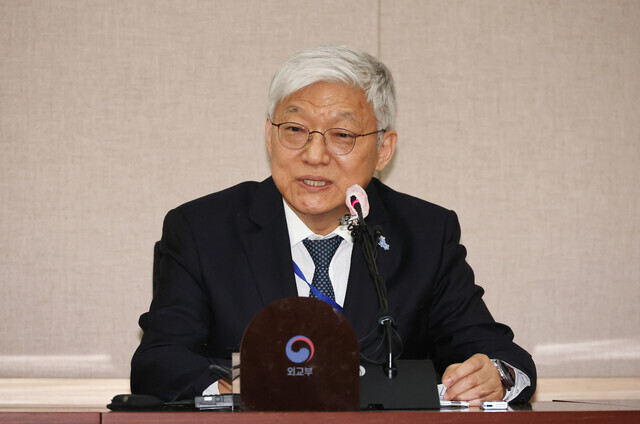Travel
Noting shared ‘values,’ Korea hints at passport-free travel with Japan

Yun Duk-min, Korea’s ambassador to Japan, speaks with the press at the government complex in Seoul on April 26, 2024. (Yonhap)
A senior official at South Korea’s Ministry of Foreign Affairs told reporters Friday that the government is considering measures for passport-free travel between South Korea and Japan. Failing that, the official said, there are considerations of a system that would simplify the entry process so that Japanese citizens can travel to Korea almost as easily as Korean citizens.
The official made these comments in a background briefing after a press availability by Yun Duk-min, South Korean ambassador to Japan. During the briefing, the official added that Japan is “largely in agreement” on the proposal.
“South Korea and Japan share the same values. We are countries in Asia where the citizens are free to say whatever they want about their leaders, and they do not have to fear political imprisonment,” the official said.
“Our levels of economic achievement are also similar. I’d even argue that Koreans have a better standard of living. I don’t think requiring a passport for Korea-Japan travel makes much sense.”
The plan touched on by the official is being likened to a South Korea-Japan equivalent of the European Union’s Schengen Agreement, which allows visa-free travel among member nations. The official proposed a system that permits Korea-Japan travel so long as travelers present a simple form of ID akin to Korea’s resident registration number or Japan’s “My Number” card.
Next year, Korea and Japan will celebrate 60 years of relations. The Foreign Ministry official suggested that South Korea and Japan “make an agreement for reconciliation and cooperation similar to the one made by Germany and France,” while noting that “a variety of discussions are currently underway.”
The official was likely referencing the Treaty of Élysée, which was signed by West Germany and France on Jan. 22, 1963, at the Élysée Palace in Paris. With that document, French President Charles de Gaulle and German Chancellor Konrad Adenauer agreed to formally end the two countries’ hostile relations and normalize diplomatic relations.
Regarding controversies and disagreements concerning the Japanese colonial occupation and forced labor mobilization by Japanese firms, the official remarked, “Those are complicated issues, but we are working on solutions, and many Japanese firms have expected to delegate significant funds dedicated to building a Korea-Japan partnership.”
“We need to view those issues [of forced mobilization] not as legal issues or nation-to-nation issues, but as person-to-person issues,” the official added.
“Even as Japanese travelers are forgoing overseas trips amid a sharp depreciation of the Japanese yen, 2.3 million Japanese tourists have visited Korea this year, and the number keeps going up,” said Yun.
“South Korea-Japan human exchange has gone beyond the 10 million era. We are now entering the 12 million era,” the ambassador added.
Noting that Korea and Japan mark 60 years of diplomatic relations next year, Yun said, “I believe there’s a need to not go backward, but upgrade our relationship to a stable one with tangible benefits for the publics of both Korea and Japan.”
By Shin Hyeong-cheol, staff reporter
Please direct questions or comments to [english@hani.co.kr]









